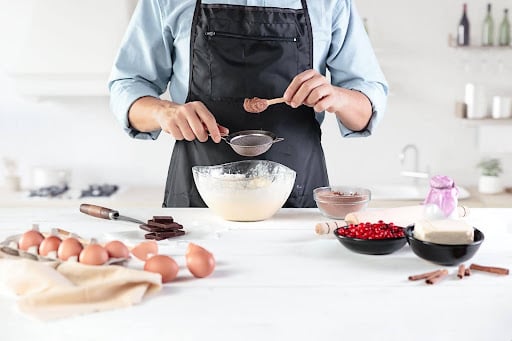How to Become a First-Class Pastry Chef: 10 Steps to a Successful Start
Becoming a pastry chef isn’t just about whipping up cakes and pastries—it’s about creating edible art that brings joy to every bite (hi, fellow sweet tooths!). But how do you go from someone who loves baking at home to earning a spot among top chefs?
1. Define Your Passion and Goals
Before you even set foot in a pastry chef school, you need to be clear about your aspirations. Are you dreaming of crafting jaw-dropping wedding cakes, running your own patisserie, or even teaching others the art of baking? Do you envision yourself crafting intricate patisserie in a boutique bakery, competing on culinary stages, or even teaching others how to bake? Defining your end goal will help you stay focused and choose the right opportunities.
cakes, running your own patisserie, or even teaching others the art of baking? Do you envision yourself crafting intricate patisserie in a boutique bakery, competing on culinary stages, or even teaching others how to bake? Defining your end goal will help you stay focused and choose the right opportunities.
Once you know what you’re aiming for, explore ways to share your culinary journey, such as blogging or writing. Not only does this build your personal brand, but it can also lead to unexpected opportunities. If your goal involves building a baking empire or writing about your culinary adventures, tools like this text summarizer can help organize your thoughts into polished writing samples. After all, a well-documented journey can open unexpected doors.
2. Start with the Basics: Work on Baking Techniques
Pastry chefs are essentially scientists in the kitchen, working with precision to create perfect desserts. According to stats, the general yearly salary for pastry chefs is around $53K, and without mastering basic techniques like dough preparation, sugar work, and chocolate tempering you can’t get there. Start with foundational techniques like making puff pastry, tempering chocolate, and working with sugar. Consistency is key, so don’t rush the learning process. Books, online tutorials, and hands-on practice will help you build confidence. Remember, pastry requires patience. You might fail a recipe ten times before nailing it, but that’s all part of the process. The small victories in perfecting these techniques will prepare you for more advanced challenges in patisserie.
If you’re wondering, how long is culinary school? It typically takes 1-2 years, but some programs offer shorter certificates. For a deeper dive into techniques, many culinary schools also teach food presentation, so your creations look as good as they taste.
3. Enroll in a Quality Pastry Chef School
This step is non-negotiable if you’re serious about becoming a next-level chef. Culinary schools provide not just hands-on training but also exposure to industry standards and networking opportunities.
Research schools that specialize in patisserie. Many culinary programs allow you to focus on pastry arts, offering hands-on training with state-of-the-art equipment. For example, schools like Le Cordon Bleu or the Culinary Institute of America have renowned pastry programs. Besides the technical skills, you’ll also gain an understanding of kitchen dynamics, time management skills, and the all-important paperwork involved in running a bakery. These programs provide mentorship and connections that can fast-track your career. Investing in your education here pays off for decades.
4. Practice Time Management Skills
Baking is all about timing. One second too long in the oven, and your masterpiece could turn into a disaster. To excel, you’ll need stellar time management skills.
Balancing multiple tasks—kneading dough, prepping fillings, and decorating—is a daily juggling act. Start practicing this at home by structuring your baking sessions. Create detailed timelines for each task. For example, know how long dough needs to proof while you prepare fillings. In a professional kitchen, time management directly impacts the quality of your pastries. Additionally, maintaining clear schedules ensures you can balance your personal and professional life. Tools like digital timers or kitchen organization apps can help streamline your workflow. Over time, this habit will build confidence and help you handle even the most stressful situations without losing focus.
5. Hone Your Food Presentation Skills
From the simplest éclairs to elaborate croquembouches, cake decoration is key. As a pastry chef, your creations need to taste good, but they also need to look stunning. Food presentation is a vital skill that sets average chefs apart from professionals. Customers eat with their eyes first, so learning how to plate desserts beautifully is just as important as perfecting the recipe itself.
Courses in food presentation or styling can help you refine this skill. Check out culinary influencers or photographers on Instagram for inspiration. The more you practice, the easier it becomes to transform simple pastries into art. Your visually stunning desserts will draw in customers and enhance your reputation as a top-tier pastry chef.
Experiment with plating styles and learn to use garnishes effectively. A pop of edible flowers or a drizzle of sauce can make a world of difference. Follow industry blogs or Instagram accounts for inspiration and trends in food presentation.
6. Get Comfortable with Paper Work
Wait—paperwork? Yes! A pastry chef’s life isn’t just about baking. You’ll need to manage inventory, costs, and schedules. Learn how to track expenses, order supplies, and manage staff schedules. Many chefs struggle with these aspects, but mastering them can set you apart. AI tools and organizational software can simplify these tasks, ensuring you focus on baking while staying efficient.
If you plan to run your own bakery, understanding the business side is even more essential. Courses in business management or consultations with experienced mentors can help. Embracing this responsibility ensures your career has a strong and sustainable foundation.
7. Develop a Cooking Blog or Write a Book
Sharing your expertise can elevate your career. Starting a cooking blog lets you showcase your baking techniques and creativity to a broader audience. It’s also a great way to network with other chefs and attract potential clients or collaborators. Who knows? This could lead to writing a cookbook or becoming a culinary influencer. Writing a book about your top chef experiences or recipes can further cement your place in the industry. However, creating quality content takes effort. Tools like a text summarizer can polish your drafts and save time. High-quality writing samples are essential if you’re pitching to publishers or building an audience. Your blog can also serve as a portfolio, highlighting your journey and expertise. Over time, this can open doors to brand partnerships, teaching gigs, or even media appearances.
8. Work on Your Kitchen Organization
A cluttered workspace is a recipe for disaster. Professional kitchens demand impeccable organization! Arrange your tools, ingredients, and equipment systematically to save time and reduce errors. Developing a habit of cleaning as you go prevents clutter from taking over and saves time during cleanup—no one enjoys scrubbing dried batter off the counter at midnight. Start by designating specific areas for ingredients, tools, and finished products. Label everything clearly to avoid confusion.
Professional kitchens often follow the “mise en place” method—everything in its place. Adopting this approach at home or work will improve your workflow significantly. After all, a clean and organized kitchen becomes second nature, leaving you free to focus on perfecting your craft.
9. Stay Open to Career Advancement Opportunities
Your journey doesn’t stop once you land a job. Whether it’s working for a Michelin-starred restaurant or starting your own patisserie, opportunities are endless. Consider certifications, competitions, or internships to refine your skills further. Building a network of industry contacts can also open doors to exciting projects. Keep an eye on industry trends to stay ahead and continuously challenge yourself to grow.
Many pastry chefs find fulfillment in teaching, opening bakeries, or consulting for others. These paths not only showcase your expertise but also diversify your career options.
10. Balance Creativity with Practicality
Pastry chefs are artists, but they’re also businesspeople. Keep innovating while staying practical—listen to customer feedback and adapt to trends without losing your unique touch. Experiment with flavors and techniques, but always stay mindful of budgets and time constraints. This balance will help you thrive in a competitive industry while maintaining your passion. With dedication, hard work, and the right mix of creativity and practicality, you’ll be on your way to becoming a next-level chef in no time.

